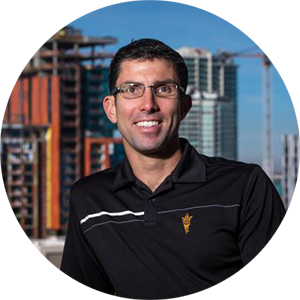
Using real-time indoor heat sensors to enhance social insulation
David Hondula, ASU School of Geographical Sciences and Urban Planning
Background
Maricopa County's hot summers are especially challenging for residents who struggle to keep their homes cool, some of whom experience heat-related illness because of indoor heat. This problem is growing worse as the number of deaths linked to indoor heat has been increasing in recent years.
Research question
How can real-time indoor temperature data enable actions that can prevent people from getting sick or dying from heat in their homes?
Methods and findings
Hondula examined the possibility of using indoor heat sensors to send real-time updates to residents' family, neighbors, and the health department. He found that technology was not the limiting factor implementing such a system. In fact, the biggest challenges relate to organizational risk management and liability, accountability, and trust.
Partners
-
Cities of Phoenix, Mesa, and Tempe
-
Foundation for Senior Living
-
Maricopa County Department of Public Health
Impact
Hondula's project enables action at the level of individuals, allowing resources to be focused where they are most needed. Successful implementation of an alerting system could be a useful complement to longer-term initiatives aimed at improving energy affordability, building weatherization, and other strategies that prevent homes from becoming dangerously hot in the first place.
David Hondula
Associate Professor
ASU School of Geographical Sciences and Urban Planning
Academic Fellow, 2019
David Hondula's research examines the societal impacts of weather and climate with an emphasis on extreme weather and health. Recent projects include statistical analysis of health and environmental data sets to improve understanding of the impact of high temperatures on human morbidity and mortality, especially within urban areas. Hondula is also engaged in quantitative and qualitative field work to learn how individuals experience and cope with extreme heat. Developing research considers how to facilitate effective governance and communication strategies for climate adaptation. These efforts are motivated by the overarching goal of reducing unnecessary weather-related illnesses and deaths through effective mitigation and intervention strategies.
Prior to joining SGSUP, Hondula was a postdoctoral scholar and assistant research professor with ASU’s Center for Policy Informatics. Hondula received his doctorate. in environmental sciences at the University of Virginia and during his graduate school tenure was also a visiting scholar at Umeå University in Umeå, Sweden and Queensland University of Technology in Brisbane, Australia. Hondula is an editorial board member for Environmental Health Perspectives and a member of the Association of American Geographers, American Meteorological Society (AMS), International Association for Urban Climate (IAUC), International Society of Biometeorology (ISB), and International Society for Environmental Epidemiology (ISEE).
